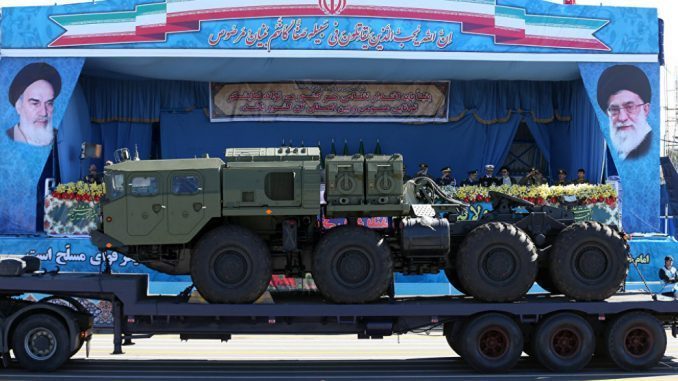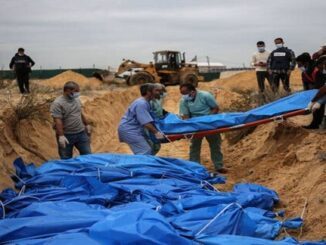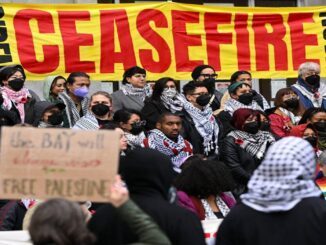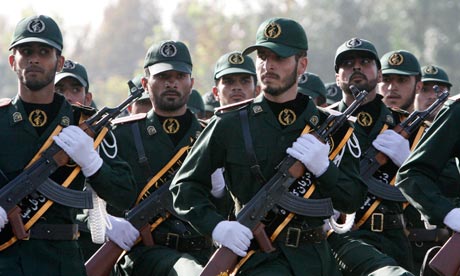
Iran’s armed forces said it has conducted a test of the Russia-supplied S-300 long-range surface-to-air missile system, which was bought recently from Russia, during its latest military drills while Israel voiced concerns over the incident.
The Iranian drill on Saturday, dubbed “Damavand,” saw the Iranian armed forces test the Russian-made system against a variety of aerial targets, including a ballistic missile which, according to Brigadier-General Farzad Esmaili, the commander of Iran’s Khatam al-Anbiya Air Defense Base, was “smashed” by the S-300.
According to Iran’s Tasnim news, the drill also saw the Iranian military test the system’s electronic warfare measure to lock onto targets in difficult conditions.
Iranian State TV aired footage of the missiles launching, saying that the drill took place in Iran’s central desert region, without giving a precise location.
According to Iran’s IRIB news agency, the country is now in the midst of developing its own version of the S-300 system, quoting Brig.-Gen. Esmaili, as saying the Bavar-373 system, which “would be [more] technologically advanced than the S-300” was due to be tested “in the near future.”
Tehran and Moscow signed a contract for the S-300 in 2007, but it was suspended in 2010 after the UN Security Council passed a resolution banning the sale of advanced weapons to the Tehran.
In December 2016, Iran’s ambassador in Moscow Mehdi Sanayee said that Russia had finished executing the contract on supplying Iran with divisions of S-300 missile systems to Iran. According to media reports, Russian-made S-300 air defense systems delivered to Iran will become operational by late March 2017.
The restriction was lifted last year after Iran and six leading world powers signed a deal addressing concerns over Iran’s nuclear program. The development allowed Russia and Iran to renegotiate the terms of the almost decade-old contract, resolving a dispute over its suspension.
Iran insists that its acquisition and development of better weapons like the S-300 is necessary to protect itself from potential military aggression. Tehran’s long-standing regional rivals include Israel and Saudi Arabia.
Israel voices concerns
Sources in Israel said they are cautiously monitoring the situation. According to Abraham Assael, a former IDF brigadier-general, the S-300 technology cannot be ignored.
“The S-300 advanced missile defense system is a system that wasn’t there before and which is very dangerous,” Assael told The Jerusalem Post on Sunday.
While the S-300 is an older system with radar capabilities unable to detect stealth technology like the F-35 fighter jet, “it’s very good against third or fourth generation combat aircraft,” which make up the majority of Israel’s air force.
Israel had long sought to block the missiles sale to Iran, and remains concerned that Iran will violate the international accord signed with world powers aimed at preventing it from developing nuclear weapons. Jerusalem is also concerned that the S-300 might have an affect on Israel’s air superiority in the region.
Israel’s Air Force recently received the F-35, which according to senior Israeli officials, will give Israel complete air superiority in the region for the next 40 years. Israel is set to receive two full squadrons of the F-35 by 2022 and with an extremely low radar signature, it is able to operate undetected deep inside enemy territory as well as evade advanced missile defense systems like S-300s, according to Israeli sources.
In addition, the notion of Iran developing its own advanced missile defense system is not surprising, Assael said.
“The Iranians are well-advanced in their technology. In the last decade or two we can say that they developed a lot, especially in the field of rockets,” the retired general said, adding that while it takes time to develop a complex system, the Iranians are very capable of developing a system even more advanced than the S-300.
According to Assael, “if tomorrow we wanted to strike Iran, and I’m not saying that we do, we now need to take into consideration that Iran now has a very good anti-aircraft system.”
Iran’s reportedly successful testing and subsequent operational status of the system comes amid mounting tensions between Tehran and Washington.
Iran’s Supreme Leader Ali Khamenei has dismissed calls from US President Donald Trump’s administration to stop testing ballistic missiles and in February, Mojtaba Zonour, a member of Iran’s National Security and Foreign Policy Commission and a former Islamic Revolution Guards Corps official, warned that an Iranian missile could hit Tel Aviv in under seven minutes.



